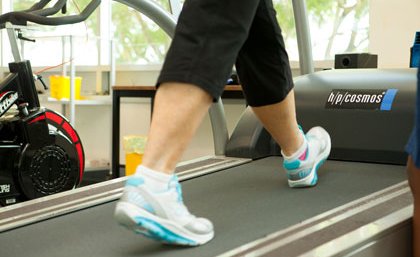
Can high-intensity exercise improve the physical and emotional health of people with mental illness? University of Queensland researchers are seeking volunteers to help find out.
Researchers from the Centre for Research on Exercise, Physical Activity and Health at UQ’s School of Human Movement Studies hope to improve the wellbeing of people with mental illness by comparing high-intensity to moderate-intensity exercise.
PhD candidate Justin Chapman said the study provided an opportunity for people with mental health issues to undertake exercise training in a safe environment under expert supervision.
“People with mental illness tend to face psychosocial barriers to the uptake of exercise and a healthy lifestyle, which may contribute to the poor physical health and lower life expectancy experienced by this group,” Mr Chapman said.
“We know exercise improves physical and mental health, quality of life and general wellbeing.
“However, very little is known about the effectiveness of different types of exercise, or what specific exercise programs suit people with mental illness.”
Mr Chapman said high-intensity interval training had health benefits for people with cardiovascular disease, but this would be the first study of its kind using the training in a mental health context.
“This type of training has gained rapid appreciation among clinicians because it increases fitness in a shorter timeframe than moderate-intensity continuous training, and it is suitable for people of all fitness levels” he said.
“As part of the study, participants will be randomly selected to take part in either high-intensity interval training or a moderate-intensity exercise program.
“They’ll complete a 12-week exercise training program supervised by an exercise physiologist, with three sessions each week.”
Changes in aerobic fitness, physical activity, body composition, cardiovascular health and psychological wellbeing will be measured before and after the program.
“We are also interested in whether or not participants enjoy these exercise programs, and which one is most acceptable,” Mr Chapman said.
Participants must be 18 or older, receiving mental health services, and either have a mental illness, or have been experiencing symptoms such as depression, anxiety or stress for several weeks. Participants need not be fit or physically active, and the exercise will be tailored to individuals’ abilities.
Testing and training will take place at a private gym at UQ’s St Lucia Campus, with parking provided.
For more information phone Mr Chapman on 0432 299 240 or email justin.chapman@uq.net.au
Media: Helen Burdon, Faculty of Health and Behavioural Sciences, +61 7 3365 7436, 0412 744 437, h.burdon@uq.edu.au; Caroline Day, School of Human Movement Studies, +61 7 3365 6764, caroline.day@uq.edu.au.




